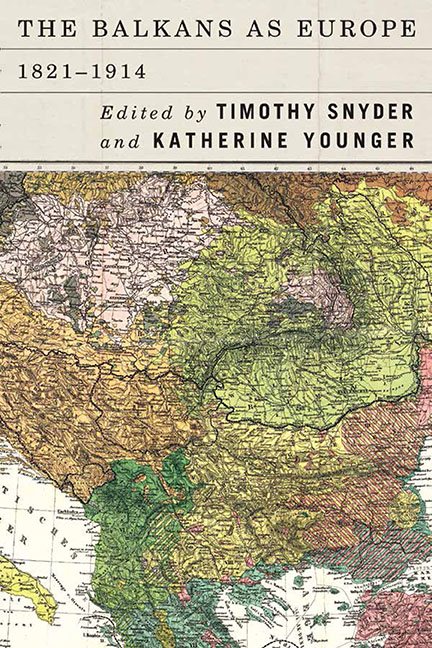Book contents
- Frontmatter
- Contents
- A Note on Terminology
- Maps
- Introduction
- 1 Balkan Initiatives to Make Europe: Two Cases from Mid-Nineteenth-Century Dalmatia
- 2 The Homeland as Terra Incognita: Geography and Bulgarian National Identity, 1830s–1870s
- 3 Liberation in Progress: Bulgarian Nationalism and Political Economy in a Balkan Perspective, 1878–1912
- 4 Emigrants and Countries of Origin: The Politics of Emigration in Southeastern Europe until the First World War
- 5 The Quiet Revolution: Consuls and the International System in the Nineteenth Century
- 6 The Hollow Crown: Civil and Military Relations during Serbia's “Golden Age,” 1903–1914
- List of Contributors
- Index
- Rochester Studies in East and Central Europe
2 - The Homeland as Terra Incognita: Geography and Bulgarian National Identity, 1830s–1870s
Published online by Cambridge University Press: 17 July 2019
- Frontmatter
- Contents
- A Note on Terminology
- Maps
- Introduction
- 1 Balkan Initiatives to Make Europe: Two Cases from Mid-Nineteenth-Century Dalmatia
- 2 The Homeland as Terra Incognita: Geography and Bulgarian National Identity, 1830s–1870s
- 3 Liberation in Progress: Bulgarian Nationalism and Political Economy in a Balkan Perspective, 1878–1912
- 4 Emigrants and Countries of Origin: The Politics of Emigration in Southeastern Europe until the First World War
- 5 The Quiet Revolution: Consuls and the International System in the Nineteenth Century
- 6 The Hollow Crown: Civil and Military Relations during Serbia's “Golden Age,” 1903–1914
- List of Contributors
- Index
- Rochester Studies in East and Central Europe
Summary
The key role of geography as an instrument for national identity formation is one of the specific characteristics of Bulgaria in the nineteenth century. Geography was given a prominent place in the curriculum as soon as a Bulgarian secular education system was established. The first textbook on the subject was published in 1835. By the end of Ottoman rule, in 1878, the total number of geography textbooks for Bulgarian primary and high schools had reached 38 (54 if reprints are counted). In terms of the number of textbooks, geography was second only to Bulgarian language—69 primers (or a total of 107 with reprints)—and almost on a par with religion (31 textbooks, or a total of 58 with reprints). Considering that the Orthodox Christian religion and the Bulgarian language were the two unquestionable pillars of the emerging national identity, the fact that geography had an equal place in the curriculum with those two subjects is indicative of its importance in shaping a sense of national belonging. History was a significantly less developed discipline than geography. The educational system functioned without a textbook on the subject until 1844, and even after that the number of Bulgarian history textbooks (10; 16 with reprints) remained modest.
The priority of geography over history was an exception to the norm followed by European educational systems in this period. In Europe, geography was regarded as an auxiliary discipline and usually was taught as part of other compulsory subjects. For example, the pedagogical concept of Jesuit colleges was that history could not be understood without some geography, while geography could not be understood without some cosmography. In France in the era of the revolution, geography became an elective subject that could be taught by the teachers of natural history or ancient languages, or by the librarian. Still, geography was most often taught as part of history courses. This was true even for the German Realgymnasien—secondary schools that focused on modern languages and the natural sciences—although their curricula included more classes in geography than those at the humanistische Gymnasien. The most popular definition of geography was that along with chronology, it was “one of the two eyes of history,” which explains why, during the first half of the nineteenth century, the most commonly used cartographic genre in the educational systems in France, Britain, and Germany was the historical atlas.
- Type
- Chapter
- Information
- The Balkans as Europe, 1821–1914 , pp. 31 - 53Publisher: Boydell & BrewerPrint publication year: 2018



